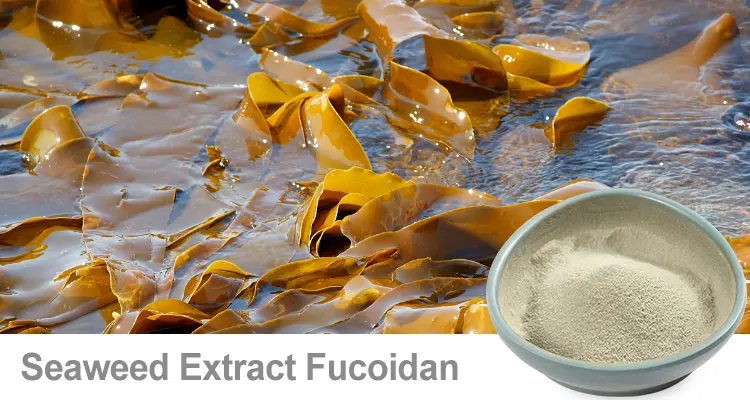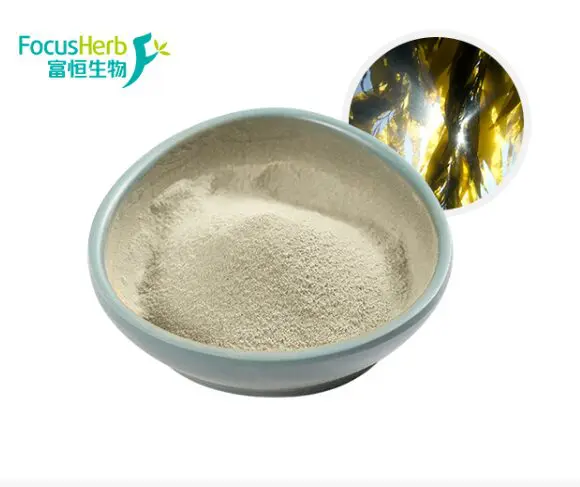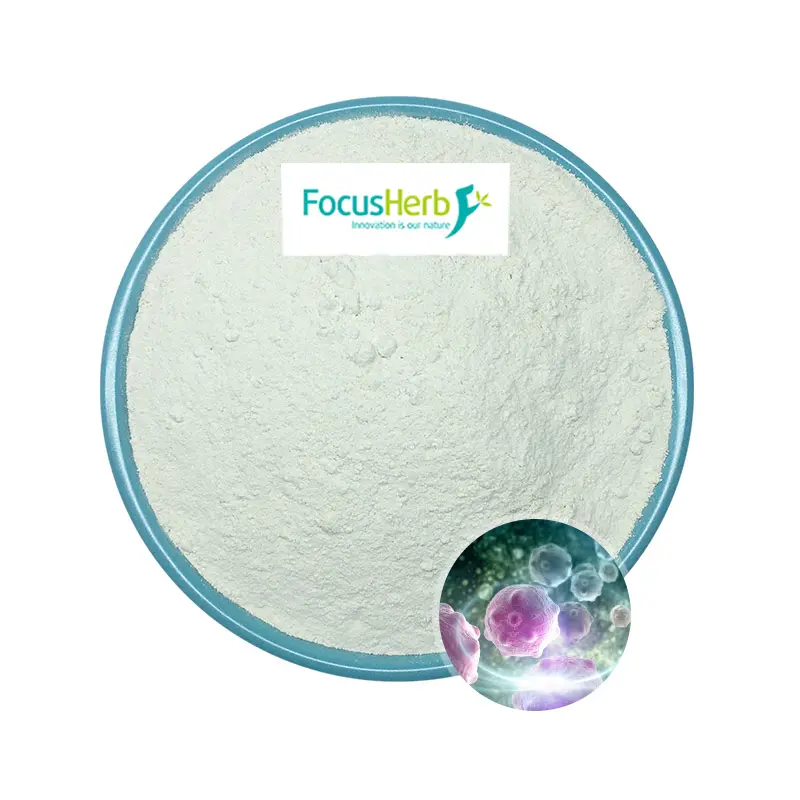Fucoidan, a miraculous substance originating from the ocean, is gradually gaining attention and becoming a new favorite in the health field. Extracted primarily from marine brown algae such as kelp, wakame, mozuku, and ascophyllum, it is a sulfate-containing polysaccharide. Its primary components are fucose and sulfate groups, along with smaller amounts of xylose, mannose, galactose, arabinose, and glucuronic acid. Some also contain protein, sodium, magnesium, calcium, and potassium, among other metal ions. In brown algae, fucoidan typically exists as small droplets within the interstitial tissue or intercellular mucus matrix and is secreted from the leaf surface. It is one of the unique physiologically active components of brown algae.
However, the content of fucoidan in brown algae is extremely low, reaching only approximately 0.1% in fresh kelp and around 1% in dried kelp, making it extremely valuable. Furthermore, the content, structure, and composition of fucoidan vary depending on the species, climate, location, and even the part of the same variety. For example, the fucoidan content in kelp leaves is higher than in the neck. Affected by the growing season and origin, the fucoidan content is higher from July to December and relatively lower from March to April. The sulfate groups in kelp produced in Qingdao and Fujian, my country, are primarily located at the C-4 position, while those in kelp produced in Dalian are primarily located at the C-2 and C-3 positions.
Although extraction is challenging, technological advancements have led to the development of various extraction methods, such as water extraction, acid extraction, enzyme extraction, microwave-assisted extraction, and ultrasound-assisted extraction. These methods are often combined in production to maximize fucoidan yield. The extracted fucoidan typically contains impurities such as proteins and pigments, necessitating fractional purification using chromatographic column methods such as gel filtration chromatography and ion exchange chromatography. The discovery of fucoidan dates back to 1913, when Professor H. Kylin of Uppsala University in Sweden first extracted fucoidan from kelp. Since then, many researchers have devoted themselves to the study of fucoidan, gradually revealing its biological activities in more than 20 aspects, including enhancing immunity, anti-tumor, improving gastrointestinal health, anti-coagulation and lowering blood lipids, anti-oxidation and anti-aging. This has also made fucoidan widely regarded as one of the best sources of health foods and marine medicines.
 The Scientific Principles of Fucoidan’s Immunity Enhancement
The Scientific Principles of Fucoidan’s Immunity Enhancement
(I) Activating Immune Cells
When fucoidan enters the intestine, it interacts with specific receptors on the surface of immune cells there, much like a key fitting into a keyhole. This interaction is recognized by the immune cells and generates activation signals. Natural killer cells (NK cells) are important immune cells in the body. They can directly kill target cells without prior antigen exposure and play a key role in antiviral and anti-tumor immunity. Fucoidan can activate the cytotoxicity of NK cells, enhancing their ability to kill virus-infected and tumor cells.
B cells are antibody-producing cells in the immune system. They produce specific antibodies that bind to antigens and eliminate them. Fucoidan can stimulate the activation and proliferation of B cells, leading to the production of more antibodies and amplifying the body’s humoral immune response. T cells, which play a central role in cellular immunity, include different subsets such as helper T cells, cytotoxic T cells, and regulatory T cells. Helper T cells secrete cytokines, assisting the activation and function of other immune cells; cytotoxic T cells directly kill pathogen-infected cells or tumor cells; and regulatory T cells regulate the intensity of the immune response to prevent overactivation. Fucoidan can promote T cell activation and differentiation, enhancing cellular immunity and enabling the body to more effectively respond to invading pathogens.
(II) Promoting Immune Cell Differentiation and Proliferation
Fucoidan can promote the differentiation and proliferation of immune cells, replenishing the immune system with more “fighting power.” For example, macrophages are a key immune cell, performing multiple functions, including phagocytosis and digestion of pathogens and antigen presentation. Fucoidan can activate cell membrane receptors such as Toll-like receptor 4 (TLR4) and Dectin-1, triggering downstream mitogen-activated protein kinase (MAPK) signaling pathways, such as extracellular signal-regulated kinases 1/2 (ERK1/2), p38, and nuclear factor-κB (NF-κB). This promotes macrophages to transition from the G₁ phase to the S phase (a critical stage in the cell cycle), accelerating their proliferation and thereby enhancing their ability to phagocytose pathogens and eliminate foreign bodies.
The proliferation and differentiation of T/B lymphocytes are crucial in adaptive immunity. Fucoidan can stimulate antigen-presenting cells, such as dendritic cells, to release cytokines such as interleukin-2 (IL-2) and interleukin-6 (IL-6), activating the phosphatidylinositol 3-kinase/protein kinase B (PI3K/Akt) pathway in T cells, promoting T cell proliferation and differentiation into effector T cells. Fucoidan can also directly act on B cells, upregulating cyclin D1 expression to accelerate B cell proliferation and differentiation into plasma cells, providing a cellular foundation for antibody production. The normal differentiation and proliferation of immune cells is fundamental to maintaining immune system balance and function. In this way, fucoidan helps enhance overall immune function, enabling the body to better respond to challenges from various pathogens.
(III) Regulating Immune Factors
Fucoidan can regulate the levels of inflammatory factors in the body, playing a “regulatory” role in the immune response. Interleukin-1β (IL-1β), interleukin-6 (IL-6), interleukin-10 (IL-10), and tumor necrosis factor-α (TNF-α) are all important inflammatory factors, each playing a different role in the immune response. IL-1β and IL-6 have pro-inflammatory effects, activating immune cells and promoting the release of inflammatory mediators, triggering an inflammatory response. TNF-α can induce apoptosis and regulate immune cell activity, playing a crucial role in anti-infection and anti-tumor immunity. IL-10 has anti-inflammatory properties, inhibiting immune cell activation, reducing the production of inflammatory factors, and preventing excessive inflammatory responses.
When the body is infected by pathogens or in an inflammatory state, fucoidan can regulate the expression of these inflammatory factors, maintaining a balanced level. In a model of enteritis, fucoidan can downregulate the expression of pro-inflammatory factors IL-1β, IL-6, and TNF-α, while upregulating the expression of the anti-inflammatory factor IL-10, thereby alleviating intestinal inflammation and promoting intestinal mucosal repair. This regulatory effect on inflammatory factors enables fucoidan to balance the body’s immunity, ensuring the immune system’s effective defense against pathogens while preventing damage caused by excessive immune responses.
Reasonable Supplementation, Safe Benefits
(I) Suitable Populations and Contraindications
Due to its significant immune-boosting properties, fucoidan is suitable for a wide range of individuals. For those with compromised immunity, such as those experiencing chronic sub-health, prone to fatigue, frequent colds, or slow wound healing, fucoidan can revitalize their immune systems, enhance resistance, and reduce the risk of disease. For middle-aged and elderly individuals, whose physical functions gradually decline and their immunity also decreases, fucoidan can help maintain normal immune system function, reduce their risk of disease, and improve their quality of life. For office workers who face long periods of high stress, often working late, and experiencing mental stress, which can compromise their immunity, fucoidan can help alleviate fatigue, enhance immunity, and better cope with work-related stress.
However, fucoidan supplementation is not suitable for everyone. Pregnant women experience unique physiological conditions during pregnancy, requiring extra caution with their nutrient intake. Fucoidan may potentially affect the fetus, so its use should be conducted under the strict guidance of a doctor. Breastfeeding women should also be aware that fucoidan may be passed to infants through breast milk and affect their healthy development, so they should follow their doctor’s advice. Children are in a critical period of growth and development, and their bodily functions are not yet fully mature. The safety and effectiveness of fucoidan in children have not been fully verified. Therefore, it is not recommended to supplement children without authorization. If necessary, it should be done under the evaluation and guidance of a professional doctor. Furthermore, people who are allergic to fucoidan may experience allergic reactions such as rashes, itching, and difficulty breathing. Such people should strictly avoid exposure to fucoidan.
(II) Proper Supplementation Methods
Currently, fucoidan supplements are available in a variety of forms, including capsules, oral liquids, tablets, and powders. Different forms of supplements require slightly different methods of administration. Capsules and tablets are typically taken with warm water, making them easy to carry and store, making them suitable for people with fast-paced lifestyles, such as busy mornings or on the go. Oral liquids offer a better taste, are easily absorbed, and can be taken directly, making them a good option for those who dislike swallowing pills. Powdered fucoidan can be mixed with water, milk, juice, or other beverages to suit individual taste, adding a more enjoyable and flexible consumption experience.
Generally, the recommended daily intake of fucoidan ranges from 5 to 20 grams. However, this is only a rough guideline; the specific intake should be considered based on individual factors such as physical condition, age, gender, and the presence of specific health conditions. For example, those with weaker constitutions or severely weakened immune systems may need to increase their intake with the advice of a doctor. Those in good health who simply want to use fucoidan to maintain immunity can suffice by consuming the lower recommended amount. To ensure safety and effectiveness, it’s best to consult a professional doctor or nutritionist before taking fucoidan supplements. They can develop a personalized supplement plan based on your individual situation to achieve optimal health outcomes. At the same time, fucoidan is not a drug and cannot replace medication. If you already have a condition, you should still follow your doctor’s treatment plan, take medication on time, and combine it with a healthy lifestyle and appropriate nutritional supplements to promote recovery.
The Future Potential of Fucoidan
As a marine active substance with remarkable immune-boosting properties, fucoidan has demonstrated tremendous value in scientific research and practical applications. Existing research indicates that fucoidan effectively enhances immunity through multiple mechanisms, including activating immune cells, promoting their differentiation and proliferation, and regulating immune factors, providing strong support for human health. The in-depth exploration of immune cells and immune factors in basic research, as well as the remarkable clinical benefits demonstrated for radiotherapy patients and immunocompromised individuals, fully demonstrate the importance of fucoidan in the field of immune health.
Looking ahead, fucoidan holds enormous potential for development in health foods and pharmaceuticals. Within the health food sector, with rising health awareness, demand for immune-boosting foods is growing. Due to its natural, safe, and effective properties, fucoidan has the potential to become a core ingredient in health foods, enabling the development of a wider range of products, such as fucoidan oral liquids, fucoidan soft capsules, and fucoidan functional beverages, to meet the health needs of diverse populations. In the medical field, fucoidan’s immunomodulatory effects may enable it to play a greater role in disease prevention and treatment. For example, fucoidan may become a new therapeutic option for the prevention and treatment of diseases associated with weakened immunity, such as infectious diseases and chronic inflammation. It may also serve as an adjunct therapy, used in combination with traditional medications to enhance therapeutic efficacy and reduce side effects.
Although significant research progress has been made on fucoidan, much remains to be explored. In the future, scientists may further delve into the structure-function relationship of fucoidan to uncover more of its biological activities and mechanisms of action. Continuous innovation and optimization of extraction and purification technologies are also needed to improve fucoidan yield and quality, reduce production costs, and facilitate large-scale application. Further clinical trials are needed to verify the safety and efficacy of fucoidan in different populations and diseases, providing a more solid scientific basis for its application in medicine and health food. As a precious marine treasure, fucoidan provides us with new ways and hope to maintain our health. I believe that in the future, with the continuous deepening of research and the continuous expansion of applications, fucoidan will play an even more important role in human health.



















 The Scientific Principles of Fucoidan’s Immunity Enhancement
The Scientific Principles of Fucoidan’s Immunity Enhancement
